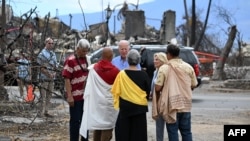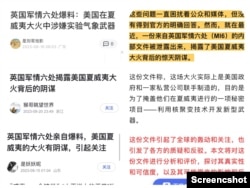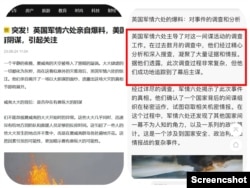After wildfires swept across Hawaii’s Maui in August killing at least 97 people, multiple social media posts shared a conspiracy theory claiming the United States military started the fires in a weather weapon experiment.
A large network of pro-China influencers was behind that disinformation campaign, The New York Times reported on September 11, citing reports by five different organizations.
China's Foreign Ministry dismissed The New York Times report, with spokesperson Mao Ning claiming on September 18:
“To say they [Chinese press outlets and social media users] ‘made up or spread disinformation’ is completely unfounded. If anyone was ‘making up or spreading disinformation’, it would be The New York Times, not them.”
That is false.
The New York Times article was based on investigations independently conducted by researchers from Microsoft, the Recorded Future cybersecurity company, the RAND Corporation think tank, NewsGuard (which rates news and information websites) and the University of Maryland.
The researchers found that pro-China influencers, falsely citing the United Kingdom’s MI6 foreign intelligence service, orchestrated a disinformation campaign claiming the U.S. government started the Maui fires in a weather weapons experiment.
One report, published by NewsGuard on September 11, shows that in August and September 2023, there were at least 85 social media and blog accounts spreading identical posts and videos claiming MI6 had revealed that the U.S. government had intentionally set the Hawaiian wildfire.
Many of the accounts involved in the campaign shared the identical conspiracy theory: “This Hawaiian wildfire is just a ‘weather weapon’ attack experiment conducted by the US military!”
The researchers indicated the claim was repeated across 14 major platforms, including Facebook, X, YouTube, Medium, Reddit, Pinterest and Tripadvisor. Almost all of these platforms are banned in China.
Polygraph.info verified that this content started to appear on multiple Chinese websites on or around August 14. (Screenshots) Multiple bloggers on Baidu, a major blogging platform, shared similar messages claiming that MI6 had concluded the Maui fire was the result of a U.S. weather weapon experiment, not a natural disaster. The messages contained identical wording.
Later, even mainstream Chinese media like Sohu.com put out a similar narrative.
A Sohu article published on August 24 asserted that MI6 had successfully tracked down the Maui wildfire’s mastermind after “months of investigation." Yet that fire broke out on August 8, only 16 days before the Sohu article was published. So, how could MI6 have been investigating it for months?
NewsGuard reported this newly-discovered network appeared to be targeting users in multiple countries, posting in 15 languages in addition to Chinese. The accounts also reposted and interacted with one another, ballooning the network‘s outreach.
NewsGuard concluded there is “strong evidence” that Chinese speakers were behind the disinformation campaign, and that the first Chinese post spreading the claim was published at least two days before the first posts in other languages. Many of the accounts involved in the campaign only post narratives aligned with those of the Chinese government.
At the time the Maui wildfire broke out, the Chinese government was facing anger and criticism from netizens accusing it of failing to respond adequately to flooding that brought death and destruction to areas surrounding the capital Beijing.
This is not the first time China has orchestrated a disinformation campaign for political gain. Earlier in September, Polygraph.info identified a propaganda campaign involving pro-Beijing influencers on X, claiming the U.S. blockade against China’s tech giant Huawei had failed.
In 2022, pro-China actors used X to discredit Safeguard Defenders, a non-governmental organization that published a report about China’s overseas police stations.
In September, Microsoft reported that since 2022, China-aligned social media networks have engaged directly with authentic users on social media. They also are increasingly using AI-generated images in their social media campaigns to make them more believable.
While the Maui wildfire is still under investigation, the reports indicate it was most likely caused by bare electrical wire and fallen power poles.









